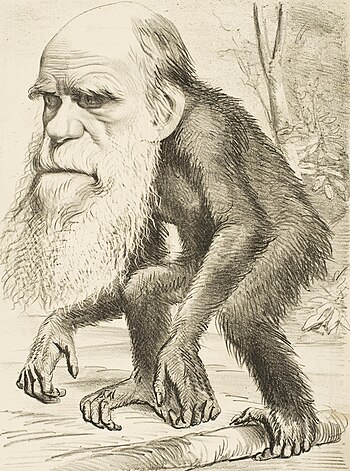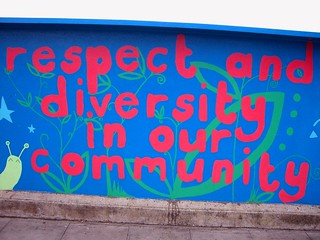| English: "A Venerable Orang-outang", a caricature of Charles Darwin as an ape published in The Hornet, a satirical magazine. (Photo credit: Wikipedia) |
Labels
Chinese culture
(16)
art
(18)
book reviews
(34)
child abuse
(10)
culture comparison
(10)
ethics
(11)
go game
(2)
history
(19)
life
(76)
love
(12)
movie reviews
(20)
my aphorisms
(97)
philosophy/reason
(13)
quotes
(42)
random thoughts
(146)
religion
(17)
suicide
(3)
March 29, 2014
Judgement, Who Is To Blame?
March 24, 2014
Faith And Truth
| Telescope and night sky (Photo credit: Wikipedia) |
Labels:
faith,
my aphorisms,
truth
March 18, 2014
True Respect
| respect (Photo credit: Heliøs) |
True respect is not to ignore the existence of poor quality of lives, such as congenital inferiority (mental or physical), by saying that we are all talented, but to understand that even those who were born with less advantages still deserve our love.
Labels:
my aphorisms,
respect
March 11, 2014
"How about money?"
| Wooden Chair (Photo credit: epSos.de) |
Another day a not so well know friend called me, telling me that her new house (must be her second house) construction had just finished. I congratulated her. Then she asked about my health and everything else. I just told her that I was in very good shape, health was improving, and mentally I was very happy. As if disappointed by my answer, she asked: "how about money?" Surprised by this unexpected question, I asked how about it? She said that for all these years I must have no saving. I said that's right, because I barely had energy to take care of myself. "So?" She asked. Then I said that despite the difficulty, I still managed to make enough for me to live life. I also added that I don't really care much about money, because I believed that extra money don't bring extra happiness.
I don't remember exactly what's her response, but I do wish that I knew the quote above at that time so I could say: since I only have one ass and one chair, I have no money problem!
Labels:
happiness,
money,
random thoughts
March 10, 2014
"Out Of Africa" - An Epic Romance Between Karen Blixen And Africa
It took me 3 steps to fully enter the world of Karen Blixen: a poster, the music, and the video (of the movie).
It was 1980s. I was still in college back in China. Rumor said that Hollywood just produced another masterpiece, Out of Africa. I liked the name, though I didn't know why. Soon I saw the poster of Karen (Meryl Streep) and Denys (Robert Redford) sitting on African plain. The harmony between the characters and nature was exotic and almost heavenly beautiful. Since then I knew I would love this movie. Later, I had chance to listen the soundtrack of the movie from audio tape (fancy technology!). The music was spectacular and it instantly made the movie more fascinating to me. Finally, I got chance to watch the whole movie in video. I still remember that I had "luxury" to watch it twice in a raw. I was totally overwhelmed.
My "obsession" with this movie has multiple reasons: the breathtaking African scenery, spectacular music, outstanding acting and story, exotic African culture, etc.. All of these elements were beautifully woven together. The cinemagraph and soundtrack of the movie were the most astonishing and up until today, they still remain as my favorite. Though the story line may not be everybody's cup of tea, it is definitely mine. The extraordinary life experience of Blixen, her adventurous spirit, independent personality, perseverance during hardship, all built up the rich aroma of my "cup of tea".
And the romance: Denys Finch Hatton, Blixen's friend and lover in real life, played by Robert Redford. From the first moment Karen meets him on the train to Kenya, Denys exhibits a wild nature, as if himself is an unseparable part of African wildness. I have to admit, Redford's role in this movie is the most handsome male figure among all men I saw in both movies and real life (Yes, very subjective!). He appeared to be perfectly physically fit and spiritually charming. He is too wild to tame, too beautiful to possess, even too ideal to pursue. Yet Blixen tried, succeeded, and still failed at the end, because ultimately, as she puts in the film: "He was not ours, he was not mine." Denys, as handsome as he is, belongs to Africa, to the wild nature and the spirit of Eagle and Lion.
Despite of the beauty or the handsomeness of Denys (or Redford), the true profoundness of this film lies all in Karen Blixen herself. Driving by her willful nature, she comes to Africa with ambition. She has her enterprise - coffee plantation. She teaches local natives English, educates them with European culture. She also help local natives with her knowledge in medicine, earns their trust and love. She becomes the owner and the mistress of her world. However, as Denys puts, "What exactly is yours?... We are not owners here, ... We are just passing through." As if he is a prophet, Karen indeed loses everything at the end. Even at the moment she could had Denys again, she loses him again. At the end of movie, she says farewell to his servant, by then her only friend, and goes back to Denmark alone with nothing, except her memory.
Blixen's memory of Africa is almost as infinite as Africa herself. It was there she faced challenge of wildness, of different culture; it was there she saw suffering of the poors, the cruelty of war; it was there she met the despair of life, also experienced the passion of true love; it was there, Denys took her in plane, flew above cloud, let her have "a glimpse of the world through God's eye". Yet in the end, it was in every beautiful moment she lived that she wishes she had left her marks, so Africa could remember her, in the same way as she remember Africa:
If I know a song of Africa, of the giraffe and the African new moon lying on her back, of the plows in the fields and the sweaty faces of the coffee pickers, does Africa know a song of me? Will the air over the plain quiver with a color that I have had on, or the children invent a game in which my name is, or the full moon throw a shadow over the gravel of the drive that was like me, or will the eagles of the Ngong Hills look out for me?
You may also like: Memoir at the Foot of Ngong Hill - Isak Dinesen's "Out Of Africa"
It was 1980s. I was still in college back in China. Rumor said that Hollywood just produced another masterpiece, Out of Africa. I liked the name, though I didn't know why. Soon I saw the poster of Karen (Meryl Streep) and Denys (Robert Redford) sitting on African plain. The harmony between the characters and nature was exotic and almost heavenly beautiful. Since then I knew I would love this movie. Later, I had chance to listen the soundtrack of the movie from audio tape (fancy technology!). The music was spectacular and it instantly made the movie more fascinating to me. Finally, I got chance to watch the whole movie in video. I still remember that I had "luxury" to watch it twice in a raw. I was totally overwhelmed.
My "obsession" with this movie has multiple reasons: the breathtaking African scenery, spectacular music, outstanding acting and story, exotic African culture, etc.. All of these elements were beautifully woven together. The cinemagraph and soundtrack of the movie were the most astonishing and up until today, they still remain as my favorite. Though the story line may not be everybody's cup of tea, it is definitely mine. The extraordinary life experience of Blixen, her adventurous spirit, independent personality, perseverance during hardship, all built up the rich aroma of my "cup of tea".
And the romance: Denys Finch Hatton, Blixen's friend and lover in real life, played by Robert Redford. From the first moment Karen meets him on the train to Kenya, Denys exhibits a wild nature, as if himself is an unseparable part of African wildness. I have to admit, Redford's role in this movie is the most handsome male figure among all men I saw in both movies and real life (Yes, very subjective!). He appeared to be perfectly physically fit and spiritually charming. He is too wild to tame, too beautiful to possess, even too ideal to pursue. Yet Blixen tried, succeeded, and still failed at the end, because ultimately, as she puts in the film: "He was not ours, he was not mine." Denys, as handsome as he is, belongs to Africa, to the wild nature and the spirit of Eagle and Lion.
Despite of the beauty or the handsomeness of Denys (or Redford), the true profoundness of this film lies all in Karen Blixen herself. Driving by her willful nature, she comes to Africa with ambition. She has her enterprise - coffee plantation. She teaches local natives English, educates them with European culture. She also help local natives with her knowledge in medicine, earns their trust and love. She becomes the owner and the mistress of her world. However, as Denys puts, "What exactly is yours?... We are not owners here, ... We are just passing through." As if he is a prophet, Karen indeed loses everything at the end. Even at the moment she could had Denys again, she loses him again. At the end of movie, she says farewell to his servant, by then her only friend, and goes back to Denmark alone with nothing, except her memory.
Blixen's memory of Africa is almost as infinite as Africa herself. It was there she faced challenge of wildness, of different culture; it was there she saw suffering of the poors, the cruelty of war; it was there she met the despair of life, also experienced the passion of true love; it was there, Denys took her in plane, flew above cloud, let her have "a glimpse of the world through God's eye". Yet in the end, it was in every beautiful moment she lived that she wishes she had left her marks, so Africa could remember her, in the same way as she remember Africa:
If I know a song of Africa, of the giraffe and the African new moon lying on her back, of the plows in the fields and the sweaty faces of the coffee pickers, does Africa know a song of me? Will the air over the plain quiver with a color that I have had on, or the children invent a game in which my name is, or the full moon throw a shadow over the gravel of the drive that was like me, or will the eagles of the Ngong Hills look out for me?
Thanks Karen for passing along your memory!
You may also like: Memoir at the Foot of Ngong Hill - Isak Dinesen's "Out Of Africa"
Labels:
africa,
keran blixen,
movie reviews,
out of africa
Subscribe to:
Comments (Atom)





